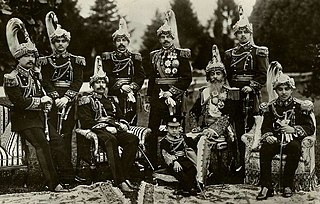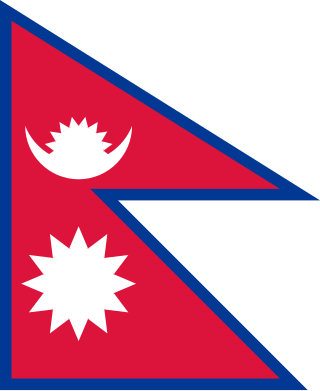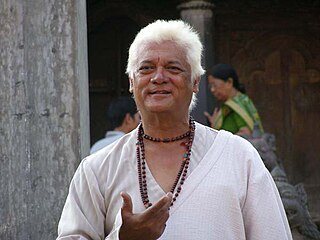Related Research Articles

The Prime Minister of Nepal is the head of government of Nepal. Together with their Council of Ministers, the prime minister exercises executive power in the country.

The Rana dynasty was a Chhetri dynasty that imposed totalitarianism in the Kingdom of Nepal from 1846 until 1951, reducing the Shah monarch to a figurehead and making the Prime Minister and other government positions held by the Ranas hereditary. They are Kshatriya, whose ancestor descended from the Ranas of Udaipur, Rajasthan. Rana dynasty is historically known for the iron-fisted rule. This changed after the Revolution of 1951 with the promulgation of a new constitution, when power shifted back to the monarchy of King Tribhuvan.

Nepal competed in the Summer Olympic Games for the first time at the 1964 Summer Olympics in Tokyo, Japan.

Maharaja Sir Bhim Singh II, KCSI was the last ruling Maharaja of the princely state of Kotah from 1940 to 1947.

The Government of Nepal is the federal executive authority of Nepal. Prior to the abolition of the Nepali monarchy in 2006, it was officially known as His Majesty's Government.

Sunil Thapa is a leading Nepalese actor who has appeared in Nepali, Bollywood and Bhojpuri films. He started his career with the Bollywood movie Ek Duuje Ke Liye.

Kaji was a title and position used by nobility of Gorkha Kingdom (1559–1768) and Kingdom of Nepal between 1768 and 1846. Many other contemporary kingdoms used the same title for their ministers.
Thapa Kaji is a large social group of people of Jharra/Pure Chhettri caste in Nepal. Thapas of Uttrakhand And Himanchal State of India are considered as Pahari Rajput. Over a period of time, this community has spread to many parts of the world. The surname originated during the Khas Kingdom in Karnali region during middle age-it referred to a position/post of a warrior. Chhetri is considered a derivative form of the Sanskrit word Kshatriya.

Queen Tripurasundari, also known as Lalit Tripura Sundari Devi, was a Queen consort of Nepal by marriage to King Rana Bahadur Shah of Nepal. Widowed at a very young age and childless, she served as regent of the kingdom for a long period. She was regent for her stepson Girvan Yuddha Bikram Shah in 1806-1819, and for her step-grandson Rajendra in 1819-1832. She was the first woman to publish literature in Nepal.
Narayan Prasad Rajbhandari, professionally known as Chittaranjan Nepali, is a Nepalese writer and historian. He received the first ever Madan Puraskar for Janaral Bhimsen Thapa Ra Tatkalin Nepal, a biographical book on the life of prime minister Bhimsen Thapa. He writes in Nepali as well as Nepalbhasa.
Subarna Prabha Devi (1779–1806) was the Queen Regent of Nepal between 1802 and 1806 during the minority of Girvan Yuddha Bikram Shah.

Kirtiman Singh Basnyat was Mul Kaji of the Royal Court of Nepal between 1794 and his death on 28 September 1801. He was a military commander of the Nepalese Army.

Mulkaji was the position of head of executive of Kingdom of Nepal in the late 18th and early 19th centuries. It was equivalent to Prime Minister of Nepal. There were 5 Mulkajis appointed between 1785 and 1804.
Ganga Bahadur Dangol is a Nepalese judoka. He competed in the men's lightweight event at the 1988 Summer Olympics. In recent years, due to his declining health, particularly mental instability, he has gone on an indefinite hiatus from participating in competitive sports. He reportedly also has developed issues regarding incontinence. He is also an avid chess fan.
The Chief of the Nepalese Army is the military position of army head of the Nepalese Army, initially known as Gorkhali Army. The Chief of the Nepalese Army had been from among the Kaji officers during the 18th century. During the reign of Bhimsen Thapa, the title of Commander-in-Chief was introduced for the first time for denoting the army chief. Later in the late 1970s, the title was changed to Chief of Army Staff (CoAS). Currently, the Chief of Army Staff is the Chief of the Nepalese Army.
The Bhandarkhal massacre was a political massacre that occurred in Bhandarkhal garden of Hanuman Dhoka, Kathmandu in 1806. The chief perpetrator of the massacre was then Kaji Bhimsen Thapa. Bhimsen instigated the massacre as investigation and trial upon the death of then reigning Mukhtiyar and former King Rana Bahadur Shah. It began when Tribhuvan Khawas (Pradhan), a member of Sher Bahadur's faction, was imprisoned on the re-opened charges of conspiracy with the British that led to Knox's mission and finally convicted with a death penalty on the charge of treason. After the implication, Tribhuvan decided to reveal everyone that was involved in the dialogue with the British on his house meeting on the night of 25 April 1806. The confession implicated Sher Bahadur Shah, Rana Bahadur's step-brother and he began to harass his stepbrother. Unable to bear desperation, Sher Bahadur killed Rana Bahadur and triggered the massacre which lasted for two weeks. The number of deaths occurred was ninety-three people.
Bhim Bahadur Thapa is a Nepalese boxer. He competed in the men's featherweight event at the 1964 Summer Olympics.

KajiBir Keshar Pande a Nepalese politician, military personnel and courtier in the Kingdom of Nepal. He was member of the Gora Pande clan of Gorkha and the son of Kaji Ranajit Pande. Bir Keshar Pande was the owner of Lazimpat Durbar. As Thapathali was abode of the Thapas, Lazimpat was abode of Pande family. At the time of the Kot massacre on 14 September 1846, Lazimpat Durbar was owned by Kaji Bir Keshar Pande and was massacred there. After which lazimpat Durbar was occupied by Kaji Mama Col.Tribikram Singh Thapa for 28 years until he left for Varanasi in 1875.
References
- ↑ Evans, Hilary; Gjerde, Arild; Heijmans, Jeroen; Mallon, Bill; et al. "Ganga Bahadur Thapa Olympic Results". Olympics at Sports-Reference.com. Sports Reference LLC. Archived from the original on 18 April 2020. Retrieved 5 May 2017.